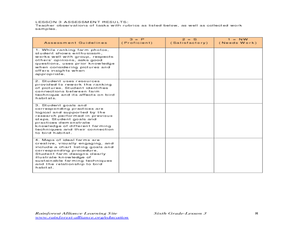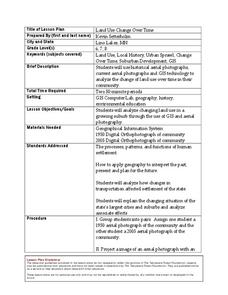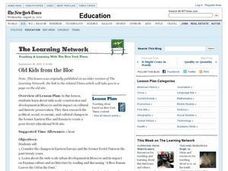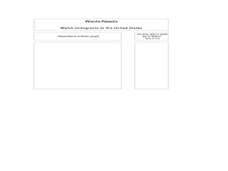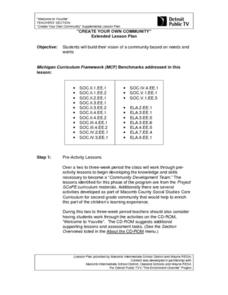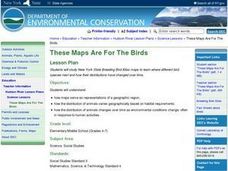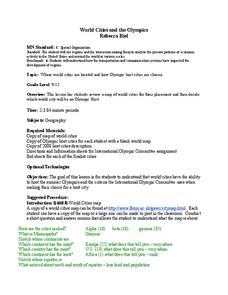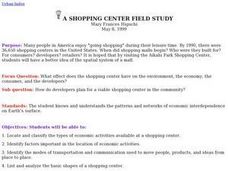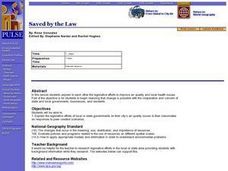Curated OER
Donde en el mundo estas?
Students give & follow directions given in Spanish, using oral, written and graphics. They use maps, globes, atlases, and remote sensing, GIS, and GPS to acquire and process information about places.
Curated OER
How can my breakfast help the birds?
Sixth graders design farms with a bird's habitat in mind. In this farm lesson plan, 6th graders research how sun grown coffee destroys a bird habitat, and then they make their own farm with a bird's habitat being preserved. They then...
Curated OER
Land Use Change Over Time
Learners use historical aerial photographs and current aerial photographs to compare the change over time to the land. For this land changing lesson plan, students analyze, compare, contrast, and list the land change in their own community.
Curated OER
Old Kids From The Bloc
Students study about wide scale construction and development in Moscow and its impact on cultural and historic preservation. They research the political, social, economic, and cultural changes in the former Eastern Bloc and create a...
Curated OER
Shedding Light on Watersheds
Students discuss what a watershed is, complete online activities showing them how to take care of a watershed, and create a model of a watershed that they experiment with to see what happens when it is disrupted by civilization.
Curated OER
Push/Pull Factors and Welsh Emigration
Students view and discuss short sections of movies that relate to immigration. Working in groups, students create a map that shows directions of internal migration in their assigned geographical area. Students review ads/booklets created...
Curated OER
World War I
Eighth graders examine the condition of the world from 1880 until the start of World War I. After watching a PowerPoint presentation, they discuss the causes and effects of the war and complete a study guide with a partner. To end the...
Curated OER
"CREATE YOUR OWN COMMUNITY"
Second graders, after spending several weeks developing skills necessary to become a "Community Development Team," create and build their vision of a community. Consideration is given for needs and wants, food, shelter, safety concerns,...
Curated OER
These Maps are for the Birds
Students identify and study New York State Breeding Bird Atlas maps to learn where different bird species nest and how their distributions have changed over time. They also identify how maps serve as representations of a geographic...
Curated OER
Canada's Arctic Barometer
Students research arctic climates. In this Web-quest investigation, students will identify Arctic climate changes, explain the effects of these changes, relate the changes to other regions, and write their findings in a letter format.
Curated OER
The Immigrant Experience
Students utilize oral histories to discover, analyze, and interpret immigration and migration in the history of the United States. A goal of the unit is fostering a discussion and encouraging students to make meaning of the bigger...
Curated OER
Me on the Map Lesson 1
Students use maps, globes, geographic information systems and other
sources of information to analyze the nature of places at a variety of scales. They identify on a map and determine the population
of the city, county, state, country...
Curated OER
World Cities and the Olympics
Students examine the various cities in which Olympics have been held. Using a map, they describe the reasons why those cities were chosen and choose their own city for the Olympics and state the reasons why. They examine information...
Curated OER
Green Spaces
Students map the green spaces around their school and predict the impact of population growth on green spaces in their region.
Curated OER
Mobility: A Green City, Past, Present, and Future
Students explore transportation systems through history. In this transportation instructional activity, students determine how modes of transportation affect quality of life and design transportation plans for cities.
Curated OER
Hello Mexico City
Students research and explain the functions, characteristics, and cultural aspects of Mexico City and analyze how they have affected development and settlement. Students work in groups to gather information and report back to the class.
Curated OER
U.S. History: What Happened Here?
Students apply the global positioning system to create maps of local historical sites. By collaborating with local historical groups, they research events and relate them to broader, national history. In addition to writing essays...
Curated OER
Development Issues in the Northern Suburbs
Students demonstrate the ability to obtain geographic information from a variety of print and electronic sources. They use a variety of maps and data to identify and locate geographical features of Minnesota and Anoka County. in...
Curated OER
A Shopping Center Field Study
Students analyze how developers plan for a shopping center. They take a field trip to a nearby shopping center. Also students participate in a shopping center scavenger hunt. Students identify factors important to the location of...
Curated OER
LLoyd's Corner
Students write a description of how a local environment has changed over time and why these changes have occurred accordingly. They describe and record changes in Lloyd's corner over time as depicted in pictures taken at four different...
Curated OER
Immigrant Photo Analysis
Pupils examine photographs taken of immigrants during late 1800s and early 1990s in America, and identify factors involved in immigration through examination of primary documents that include statistics, trends, graphs, photographs,...
Curated OER
Communities Across the US
Third graders explore communities. In this communities instructional activity, 3rd graders discover different types of communities. Students compare and contrast communities.
Curated OER
What If We Run Out?
Students explore the consequences of shrinking habitats and the human impact on wildlife populations. They participate in a game to study the consequences and describe the preservation of animal habitats.
Curated OER
Saved by the Law
Students explain the legislative efforts of local or state governments on their city's air quality issues to their classmates as responses to peer-created scenarios. They determine that change is possible with the cooperation and...



